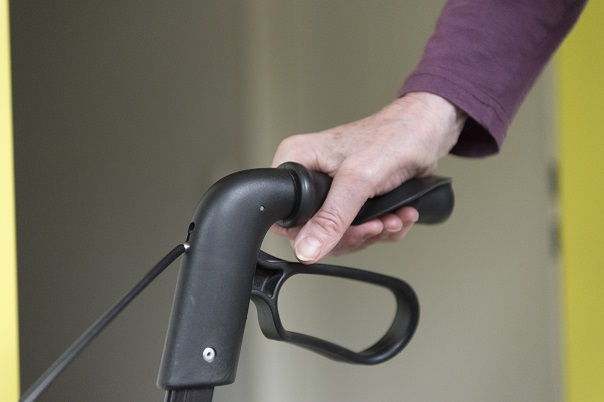employees
KIT has committed to adopting family-aware work and education policies to ensure compatibility of job and family for all employees. In line with the Gender Equal Opportunities Act of the State of Baden-Württemberg, KIT as an employer attaches high value to improving the work-life balance of employees with a family or staff caring for relatives and ensuring equal employment and career opportunities for women and men. On behalf of KIT, the Gender Equal Opportunities Commissioners are responsible for implementing gender equal opportunities as defined in the Federal Constitution (Article 3, par. 2). Moreover, they are responsible for enhancing occupational safety and health and increasing the staff’s awareness in handling conflicts at work, discrimination, mobbing, stalking, and sexual harassment.

KIT as an employer wishes to support working fathers and mothers in coping with their challenges and balancing job and family. The Family Portal of KIT provides all relevant information on this topic and encourages the employees to obtain more information. It offers a wide scope of advice on the job, studies, health, and care for relatives and also addresses international scientists who go abroad for research or return from abroad.
KIT offers several working time models, including teleworking or part-time work, to increase flexibility for a better compatibility of job and family.
To support expectant parents, KIT has developed special offers. Advice and information services are to accompany employees in times of pregnancy and after childbirth. Childcare services offered by KIT include a parent-child office, care for school children, and an emergency childcare program named “FlexiKids”.



News
Parental allowance can lead to more equality (05/2022)
Parental allowance has the potential to lead to more equality. This is because it takes effect at a time that is central to the distribution of roles in the family: the birth of the first child. In Germany, the majority of mothers still stay at home with their babies, while fathers continue to work. These roles become entrenched over time. Mothers work part-time far more often than fathers, they are less likely to have a career, they often earn less money, and to date they have not been paid even half as much in pensions as men. With the parental allowance introduced 15 years ago and the two partner months, politics shook up the traditional family model for the first time. Suddenly, it was desirable for women to return to work after twelve months of parental leave and for fathers to care for their child as well. The full article on the subject can be found here.
Study and Recommendation for Action: Protecting Parents and Family Caregivers from Discrimination (05/2022)
This PDF from the Federal Anti-Discrimination Agency summarizes the results of two studies. The studies deal with topics such as parental leave, discrimination experiences of caring, working relatives, as well as the legal situation. In addition to mere figures, recommendations for action can also be found here.
Education and Participation Package (05/2022)
Since 2011, the state education and participation package (BuT) has been intended to ensure that children from low-income families receive more support. It is intended to support the financing of sports courses, music lessons or private tuition. However, the application is bureaucratically complex, which means that only about 11 to 15 percent of those entitled use the services according to the Nachhilfeanbieter Studienkreis. Some families are not even aware that such benefits exist. For this reason, the "Studienkreis: Die Nachhilfe" has put together a fact sheet with numbers, facts and studies.
Federal Minister for Family Affairs wants family care allowance (05/2022)
Federal Family Minister Lisa Paus is in favor of introducing a family care allowance. Paus explained that those who reduce their working hours for care should receive a wage replacement benefit and thus be financially secure. Just as young parents receive parental allowance, caring relatives must also be entitled to family care allowance. The minister spoke on the occasion of the publication of new data from the Deutschen Alterssurvey. Accordingly, the use of caregiving and employed relatives has increased significantly during the corona pandemic. Women in particular supported and cared for their relatives, neighbors or friends with significantly more time, as the study shows.
Friedrich-Ebert Stiftung: Fair, Social and Crisis-Proof - Reform Proposals for Parental Benefits (05/2022)
The concept of parenthood has changed in recent years. In particular, the introduction of parental allowance in 2007 has triggered a political and social change. However, the available analyses show that, despite all the achievements, an egalitarian division of labor and equal use of parental allowance are still far from being achieved in 2022. The study also shows how strongly existing social structures are interwoven. This analysis shows that, despite all the achievements, we are still a long way from an egalitarian division of labor and equal use of parental benefits in 2022. The complete study can be found here.
"Hidden heroes" (04/2022)
Current figures show that child poverty is not a marginal phenomenon in society. In Baden-Württemberg, almost every 5th child is at risk of poverty. This has a negative impact on children's development and growing up. The animated film "Hidden Heroes" wants to draw attention to this problem. It follows three children from different backgrounds, family and living conditions and deals with their everyday problems: No homework done, no money for a sports club, no friends. To cope with reality, they make up the wildest stories about it: In their heads they are superheroes* and have various superpowers that no one can see. But they also experience reality: their living situation is precarious, their parents are poor and their superpowers are wishful thinking. The children escape from their problems into their own stories. The full film can be found here.
Child Benefit and Co.: An Overview of Family Policy Benefits (04/2022)
Policymakers have taken a number of measures to support families and reduce the risk of poverty among children - sometimes with uncertain benefits. At last count, the Federal Ministry of Family Affairs counted around 150 family-related benefits; the best-known benefits include, for example, child benefit, child supplement, child bonus, child allowances, parental allowance and the education and participation package. Further information on the benefits can be found here.
"If you want to invest in the future, you have to invest in our children". (04/2022)
On 28.04.2022, Hubertus Heil, Federal Minister of Labor and Social Affairs, gave a speech in the plenary session of the Bundestag on the child supplement. In this speech, he emphasized the importance of investing in the future, i.e. in our children, and would like to implement the basic child allowance before the end of this legislative period. This basic security is intended to create more social security and opportunities for participation. Further information on the speech can be found here.
New Culture Channel: Guidance for companies for a family-conscious corporate culture. (04/2022)
With the new Culture Channel, the corporate program provides employers and their employees with impetus and assistance in translating the experiences of the past two years into sustainable compatibility strategies. After all, one challenge here is to flexibly shape the transition to the "new normal." The experiences gained during the Corona crisis can serve as a basis for embarking on the path to a family-conscious corporate culture together with employees. Further information can be found here.
How to talk to children about the terrible news from Ukraine? (03/2022)
Shocking images of the war in Ukraine are shown in all media. Children and young people see such scenes and usually find it difficult to categorize such images. Now it is important that parents and educators in schools and youth work talk to them and take their fears seriously. With younger children, it is more important not to expose them to gruesome images of war and to answer their questions. Older children from the age of about 12 or 13 can be introduced to politics in a factual way and you can talk to them sensitively about the causes of war, for example, but above all about the suffering of the victims. Also important is the use of age-appropriate news formats (e.g. Logo, Zdf) that present the events in Ukraine professionally for children. More information can be found here.
In the professional information "Working with Children and Adolescents in the Context of the War in Ukraine" of the Paritätischer Gesamtverband, references to factual and age-appropriate information were compiled in order to offer support to professionals in child and youth work, families and adult caregivers in their work.
Press release: Fair distribution of care work must become a declared political goal (02/2022)
Against the backdrop of Equal Care Day, Equal Pay Day and International Women's Day, the Care Work Fair Sharing Alliance publishes its assessment of the coalition agreement. Despite welcome plans of the coalition, the civil society alliance sees deficits and demands more comprehensive measures from the federal government to close the care gap.
The key to a gender-equal future lies in the fair distribution of care, domestic and gainful employment work between the sexes. "We welcome the coalition's ambition to achieve gender equality in this decade. However, this can only succeed if closing the care gap becomes a central political goal."
Two thirds of minijober*innen are women. The increase in income limits planned by the coalition will lead to an expansion of these precarious employment relationships, which blatantly runs counter to the goal of securing women's independent livelihoods in both the short and long term. The alliance also sees a need for improvement in tax law. It is necessary to introduce individual taxation with a transferable basic allowance in order to promote the livelihood-securing employment of women in a marriage.
The detailed assessment and the demands of the Alliance members can be found here.
Broad alliance calls for ambitious overall strategy to combat child poverty
Together with numerous other organizations, the Working Group of German Family Organizations is calling on the German government to launch an overall strategy to combat child poverty in Germany when it draws up the National Action Plan on the EU Child Guarantee. In a key points paper, the 17 organizations call for a cross-departmental approach in that, in addition to the Federal Ministry of Family Affairs, other federal ministries as well as the states and municipalities must be involved, with the involvement of public and independent child and youth welfare services, civil society and academia.
Further information can be found here.
According to survey: Fewer and fewer think Germany is child-friendly
According to the published survey by the German Children's Fund, less than half of those surveyed said Germany was a child-friendly country. This was eight percentage points less than four years ago and ten percentage points less than seven years ago. The results of the survey can be read here.
"Family needs a home. Create affordable and sufficient housing for family!" (01/2022)
Affordable, family-friendly housing and a suitable living environment are fundamental to good family life. Against this backdrop, ZFF formulates political demands and recommendations for action to shape a family-friendly housing policy in a position paper.
The complete position paper can be found here.
Listening tip: "Family-friendly university has a lot to do with communication, regularly". (04/2021)
How can a university sustainably position itself to be family-friendly? What role do a strategically designed compatibility policy and comprehensive communication to all target groups play? Bettina Schweizer, audit project manager at the University of Bremen, answers these and several other questions in the podcast of the audit berufundfamilie. The podcast can be found here.
"Maternity has no gender" campaign
Motherliness is associated with traditional values that cause women to take on more private and professional care work. The Federal Association of Mothers' Centers wants to change this with its campaign "Motherliness has no gender". The reconciliation of care, household, childcare and work is a task for society as a whole and not a "women's issue". Further information on the campaign can be found here.
Support for families in Germany and comparison with other European countries (11/2021)
What is the situation regarding the promotion of families in Germany and how does the local policy compare with other European countries? The Institute of the German Economy has investigated this in a new study. The summary of the results can be found here.
German Youth Institute Family, Childhood, Youth 2030 (02/2021)
The new special issue of the research magazine DJI Impulse takes a look into the future until 2030 and explores the question of what support young people and their families need.
Megatrends such as globalization, demographic change, migration and digitalization, but also crises such as the corona pandemic are having a profound impact on social coexistence. For families, children and young people, these developments are accompanied by opportunities, but also by challenges. Against this backdrop, the newly published special issue of the research magazine DJI Impulse takes a look into the future up to 2030 and explores the question of what support young people and their families need in light of current and already foreseeable social developments.
The complete issue can be found here.
Legal entitlement to all-day care for children of primary school age (09/2021)
From 2026, the legal right to all-day care for children of primary school age will be enshrined in law; this should help to better reconcile family and career.
However, economists from Wuppertal have calculated the costs of this project. The results show that the planned financial support from the federal government will not be sufficient. In addition, some Kommunen are already very well positioned as far as all-day schooling is concerned, but others are not, and they will have to do a lot to meet the legal requirement in the future. For this reason, a project in Frankfurt a.M. is planned to realistically estimate the costs.
The article can be read here.
